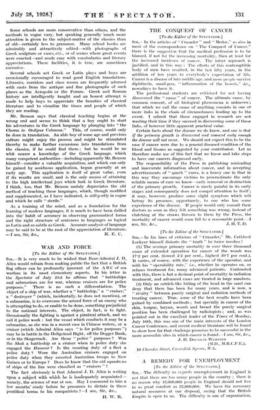THE CONQUEST OF CANCER [To the:Editor of the SPECTATOR.] Sia, — In
the articles of Crusader and Medoc," as also in
most of the correspondence on " The Conquest of Cancer," there is the suggestion that the medical profession is to be blamed, if not for the increasing mortality, then at least for the increased incidence of cancer. The latter reproach is justified, and in this way : The efforts of this contemptible body of men have resulted, in the last fifty years, in the addition of ten years to everybody's expectation of life. Cancer is a disease of late middle age, and more people survive diphtheria, small-pox, inflammation of the bowels," Ste., nowadays to have it.
The professional students are criticized for not having discovered the " cause " of cancer. The ultimate cause, by common consent, of all biological phenomena is unknown ; that which we call the cause of anything consists in one or more links in the chain of circumstances leading up to the event. I submit that those engaged in research are not wasting their time if they succeed in discovering some of these links, of however little apparent practical value.
Certain facts about the disease we do know, and one is that if the primary growth is discovered and removed early enough the disease will not recur. We should not expect this to be the case if cancer were due to a general diseased condition of the blood and tissues as suggested by your contributor. Let us therefore make use of this fact that we know and take steps to have our cancers diagnosed early.
The responsibility of the Press in publishing misleading and inaccurate information about cancer, and in accepting advertisements of " quack " cures, is a heavy one in that in this way they encourage victims to procrastinate the only reliable means of cure we know—early removal or destruction of the primary growth. Cancer is rarely painful in its early stages and consequently does not compel attention to itself ; it may, however, produce some slight symptom which will betray its presence, opportunely, to one who has some experience of the disease. If people would only consult their doctors as soon as they felt something was wrong, instead of clutching at the straws thrown to them by the Press, the mortality of cancer would soon fall to a reasonable point.--I




































 Previous page
Previous page